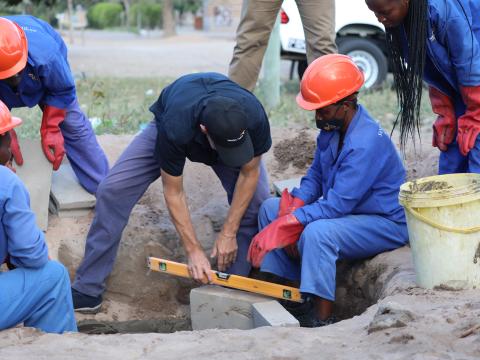Women-led improved latrines bring dignity and income to communities in southern Mozambique

By Álvaro Malamba, Communication and Advocacy Coordinator
In Gaza province, southern Mozambique, a powerful and inspiring story is unfolding. Here, under the strong sun, a different kind of warmth emanates from the determined women at the heart of a vital project, Sanitation Marketing, a human-centered market-based sanitation approach to enabling communities to construct robust and desirable sanitation products.
Matthew Pickard, World Vision Southern Africa's new Regional Director, was impressed with the approach as he witnessed firsthand the impact led by local communities. Matthew learned a remarkable sense of hope, from the champions of the approach (women masons) a clear sign that resilience and smart initiatives are truly making a difference.
"I'm genuinely impressed by what I've seen," Pickard stated, as he interacted with several women-led projects in the Guijá and Mabalane districts. "It's so good to see the real impact of our work on improving people's lives. It's not just about talking about what we do; it's about showing it."
In the above-mentioned districts, the "Sanitation Marketing" project is fundamentally changing the landscape for sanitation and women's empowerment. In a recent past, open defecation posed a significant health risk, a problem World Vision Mozambique (WV-Moz) set out to facilitate the solution by supporting the government and partners ongoing efforts to address the matter.
As a result, WV-Moz built 660 improved latrines, which brought dignity and better health to the targeted communities. But the project's success goes far beyond just construction.
The real heart of the story lies in how it empowers women. They are the driving force here, leading the construction of these crucial facilities and earning an income for their hard work. By the end of the current year project cycle, 80 women will be trained, securing their financial independence and providing for their families. It's a positive cycle of growth, where every latrine isn't just a structure, but a foundation for dignity and a more promising future.
However, Pickard's visit wasn't solely a moment of celebration. In a global landscape where donors are reducing financial resources and new humanitarian crises are erupting elsewhere in the world, the challenge of maintaining support and responding to the growing needs of communities is immense.
"We have never been in such a difficult period, where needs are more evident, yet sources of support are dwindling," Pickard pointed out. "The question remains: how do we continue to deliver our work with the same quality with fewer resources? Communities still need us, and we still retain the trust of those good-hearted individuals willing to support development projects."
Despite these challenges, Matthew Pickard's message was unequivocal: WV-Moz will redouble its efforts to justify the trust of its supporters and continue to be a beacon of hope for the most vulnerable communities. His visit to Mozambique, the first, in his capacity as Regional Director, solidifies the organisation's commitment to a future where every child, woman, and man can live with dignity and health.
The story of the women masons in Guijá and Mabalane districts, improving the landscape of sanitation for themselves, their families, and their community is a powerful reminder that even in the most challenging times, effective work can truly transform lives and build a lasting legacy of hope.